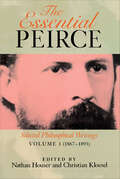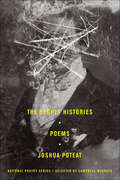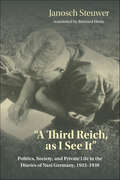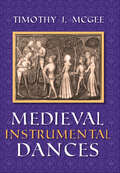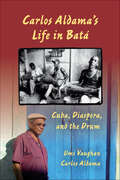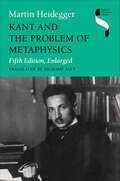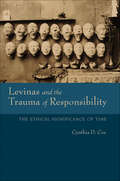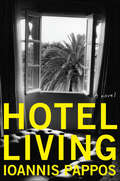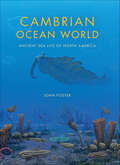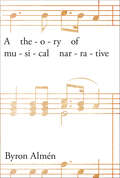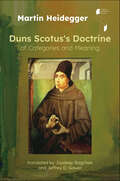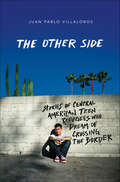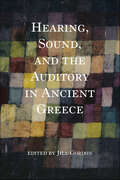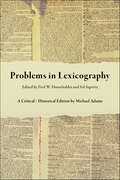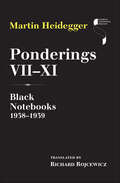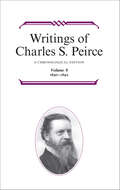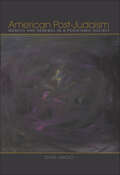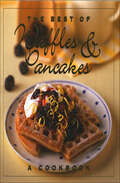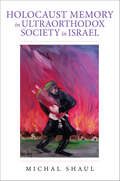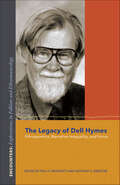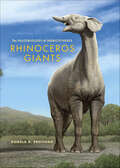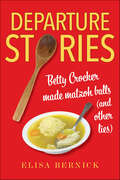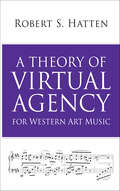- Table View
- List View
Chocolates for Breakfast: A Novel
by Pamela Moore“A gem of adolescent disaffection featuring a Holden Caulfield-like heroine.” — Vogue.com“Once I started reading it, I didn’t want to stop. . . . If your all-time favorite books include works of young-adult fiction (like Catcher), I strongly urge you to take a look." — USA Today/Pop CandyA riveting coming-of-age story, Chocolates for Breakfast became an international sensation upon its initial publication in 1956, and still stands out as a shocking and moving account of the way teenagers collide, often disastrously, against love and sex for the first time. This edition includes an introduction by author Emma Straub.Courtney Farrell is a disaffected, sexually precocious fifteen-year-old. She splits her time between Manhattan, where her father works in publishing, and Los Angeles, where her mother is a still-beautiful Hollywood actress. After a boarding-school crush on a female teacher ends badly, Courtney sets out to learn everything fast. Her first drink is a very dry martini, and her first kiss the beginning of a full-blown love affair with an older man.
The Essential Peirce, Volume 1: Selected Philosophical Writings (The Essential Peirce)
by Nathan Houser and Christian Kloesel" . . . a first-rate edition, which supersedes all other portable Peirces. . . . all the Peirce most people will ever need." —Louis Menand, The New York Review of Books"The Monist essays are included in the first volume of the compact and welcome Essential Peirce; they are by Peirce's standards quite accessible and splendid in their cosmic scope and assertiveness." —London Review of BooksA convenient two-volume reader's edition makes accessible to students and scholars the most important philosophical papers of the brilliant American thinker Charles Sanders Peirce. This first volume presents twenty-five key texts from the first quarter century of his writing, with a clear introduction and informative headnotes. Volume 2 will highlight the development of Peirce's system of signs and his mature pragmatism.
The Regret Histories: Poems
by Joshua PoteatThis powerful and provocative new installment of poetry is a recipient of the 2014 National Poetry Series Prize, as chosen by Campbell McGrath.The National Poetry Series’s long tradition of promoting exceptional poetry from lesser-known poets delivers another outstanding collection of poetry by Joshua Poteat.Through an investigation of the haunted spaces where history collides with the modern southern American landscape, The Regret Histories explores themes of ruin and nostalgia, our relationship to a collective past, and the extraordinary indifference of time to memory.For thirty years, the National Poetry Series has discovered many new and emerging voices and has been instrumental in launching the careers of poets and writers such as Billy Collins, Mark Doty, Denis Johnson, Marie Howe, and Sherod Santos.
"A Third Reich, as I See It": Politics, Society, and Private Life in the Diaries of Nazi Germany, 1933–1939
by Janosch SteuwerWith the beginning of the National Socialist dictatorship, Germany not only experienced a deep political turning point but the private life of Germans also changed fundamentally. The Nazi regime had far-reaching ideas about how the individual should think and act.In "A Third Reich, as I See It" Janosch Steuwer examines the private diaries of ordinary Germans written between 1933 and 1939 and shows how average citizens reacted to the challenges of National Socialism. Some felt the urge and desire to adapt to the political circumstances. Others felt compelled to do so. They all contributed to the realization of the vision of a homogeneous, conflict-free, and "racially pure" society.In a detailed manner and with a convincing sense of the bigger picture, Steuwer shows how the tense efforts of people to fit in, and at the same time to preserve existing opinions and self-conceptions, led to a close intertwining of the private and the political."A Third Reich, as I See It" offers a surprisingly new look at how the ideological visions of National Socialism found their way into the everyday reality of Germans.
Medieval Instrumental Dances
by Timothy J. McGeeIn Europe the tradition of secular dance has continued unbroken until the present. In the late Middle Ages it was an important and frequent event—for the nobility a gracious way to entertain guests, for the peasantry a welcome relaxation from the toils of the day. Now back in print, this collection presents compositions that are known or suspected to be instrumental dances from before ca. 1420. The 47 pieces vary in length and style and come from French, Italian, English, and Czech sources. Timothy McGee relates medieval dances to the descriptions found in literary, theoretical, and archival sources and to the depictions in the iconography of the Middle Ages. In a section on instrumental performance practices, he provides information about ornamenting the dances and improvising in a historically appropriate style. This comprehensive edition brings together in one volume a repertory that has been scattered over many years and countries.
Carlos Aldama's Life in Batá: Cuba, Diaspora, and the Drum
by Umi Vaughan Carlos AldamaBatá identifies both the two-headed, hourglass-shaped drum of the Yoruba people and the culture and style of drumming, singing, and dancing associated with it. This book recounts the life story of Carlos Aldama, one of the masters of the batá drum, and through that story traces the history of batá culture as it traveled from Africa to Cuba and then to the United States. For the enslaved Yoruba, batá rhythms helped sustain the religious and cultural practices of a people that had been torn from its roots. Aldama, as guardian of Afro-Cuban music and as a Santería priest, maintains the link with this tradition forged through his mentor Jesus Pérez (Oba Ilu), who was himself the connection to the preserved oral heritage of the older generation. By sharing his stories, Aldama and his student Umi Vaughan bring to light the techniques and principles of batá in all its aspects and document the tensions of maintaining a tradition between generations and worlds, old and new. The book includes rare photographs and access to downloadable audio tracks.
Kant and the Problem of Metaphysics (Studies in Continental Thought)
by Martin HeideggerSince its original publication in 1929, Martin Heidegger's provocative book on Kant's Critique of Pure Reason has attracted much attention both as an important contribution to twentieth-century Kant scholarship and as a pivotal work in Heidegger's own development after Being and Time. This fifth, enlarged edition includes marginal notations made by Heidegger in his personal copy of the book and four new appendices—Heidegger's postpublication notes on the book, his review of Ernst Cassirer's Philosophy of Symbolic Forms, Heidegger's response to reviews by rudolf Odebrecht and Cassirer, and an essay "On the History of the Philosophical Chair since 1866." The work is significant not only for its illuminating assessment of Kant's thought but also for its elaboration of themes first broached in Being and Time, especially the problem of how Heidegger proposed to enact his destruction of the metaphysical tradition and the role that his reading of Kant would play therein.
Levinas and the Trauma of Responsibility: The Ethical Significance of Time (Studies in Continental Thought)
by Cynthia D. CoeLevinas's account of responsibility challenges dominant notions of time, autonomy, and subjectivity according to Cynthia D. Coe. Employing the concept of trauma in Levinas's late writings, Coe draws together his understanding of time and his claim that responsibility is an obligation to the other that cannot be anticipated or warded off. Tracing the broad significance of these ideas, Coe shows how Levinas revises our notions of moral agency, knowledge, and embodiment. Her focus on time brings a new interpretive lens to Levinas's work and reflects on a wider discussion of the fragmentation of human experience as an ethical subject. Coe's understanding of trauma and time offers a new appreciation of how Levinas can inform debates about gender, race, mortality, and animality.
Hotel Living: A Novel
by Ioannis PapposRecalling both the excess of The Wolf of Wall Street, and the drifting narrator of A Single Man, Ioannis Pappos’s debut novel is a portrait of privilege, aspiration, and international finance during the wayward course of the American economy between 9/11 and the 2008 Financial collapse, and is filled with surprisingly tender observations about identity, loneliness, and human connection.“I’m homeless, but in First Class.”Stathis Rakis abandoned his small Greek village for a more worldly life, first in San Francisco, where the Dot Com Bubble had already burst, and then in Paris, France, where he is pursuing an MBA at an elite business school. After falling helplessly in love with a liberal New England journalist with a good conscience, who comes to campus with some scores to settle, Stathis moves to the United States to begin as a consultant for a company called Command. He spends the very few hours of the day that aren’t consumed by work draining the minibar, battling insomnia, and binging on more than room service. Luxury is a given, happiness is not.As the economy recovers and a new bubble expands in a post-9/11 world, Stathis drifts upward, baring witness to the criminal decadence that will become the 2008 financial crisis, as well as his new habits of indulgence—drugs, sex, and insider trading. In a world of insiders--from corporate suits to Hollywood celebutantes—Stathis remains the outsider: too foreign to be one of them, too cynical to turn back.
Cambrian Ocean World: Ancient Sea Life of North America (Life of the Past)
by John FosterThis volume, aimed at the general reader, presents life and times of the amazing animals that inhabited Earth more than 500 million years ago. The Cambrian Period was a critical time in Earth's history. During this immense span of time nearly every modern group of animals appeared. Although life had been around for more than 2 million millennia, Cambrian rocks preserve the record of the first appearance of complex animals with eyes, protective skeletons, antennae, and complex ecologies. Grazing, predation, and multi-tiered ecosystems with animals living in, on, or above the sea floor became common. The cascade of interaction led to an ever-increasing diversification of animal body types. By the end of the period, the ancestors of sponges, corals, jellyfish, worms, mollusks, brachiopods, arthropods, echinoderms, and vertebrates were all in place. The evidence of this Cambrian "explosion" is preserved in rocks all over the world, including North America, where the seemingly strange animals of the period are preserved in exquisite detail in deposits such as the Burgess Shale in British Columbia. Cambrian Ocean World tells the story of what is, for us, the most important period in our planet's long history.
A Theory of Musical Narrative (Musical Meaning and Interpretation)
by Byron AlménByron Almén proposes an original synthesis of approaches to musical narrative from literary criticism, semiotics, historiography, musicology, and music theory, resulting in a significant critical reorientation of the field. This volume includes an extensive survey of traditional approaches to musical narrative illustrated by a wide variety of musical examples that highlight the range and applicability of the theoretical apparatus. Almén provides a careful delineation of the essential elements and preconditions of musical narrative organization, an eclectic analytical model applicable to a wide range of musical styles and repertoires, a classification scheme of narrative types and subtypes reflecting conceptually distinct narrative strategies, a wide array of interpretive categories, and a sensitivity to the dependence of narrative interpretation on the cultural milieu of the work, its various audiences, and the analyst. A Theory of Musical Narrative provides both an excellent introduction to an increasingly important conceptual domain and a complex reassessment of its possibilities and characteristics.
Duns Scotus's Doctrine of Categories and Meaning (Studies in Continental Thought)
by Martin HeideggerDuns Scotus's Doctrine of Categories and Meaning is a key text for the origins of Martin Heidegger's concept of "facticity." Originally submitted as a postdoctoral thesis in 1915, it focuses on the 13th-century philosopher-theologian John Duns Scotus. Heidegger first analyzes Scotus's doctrine of categories, then offers a meticulous explanation of the Grammatica Speculativa, a work of medieval grammar now known to be authored by the Modist grammarian Thomas of Erfurt. Taken together, these investigations represent an early foray into Heidegger's lifelong philosophical concerns, "the question of being in the guise of the problem of categories and the question of language in the guise of the doctrine of meaning."This new and unique translation of one of Heidegger's earliest works offers an important look at his early thinking before the question of being became his central concern and will appeal to readers exploring Heidegger's philosophical development, medieval philosophy, phenomenological interpretations of the history of philosophy, and the philosophy of language.
The Other Side: Stories of Central American Teen Refugees Who Dream of Crossing the Border
by Juan Pablo VillalobosAward-winning Mexican author Juan Pablo Villalobos explores illegal immigration with this emotionally raw and timely nonfiction book about ten Central American teens and their journeys to the United States.You can't really tell what time it is when you're in the freezer. Every year, thousands of migrant children and teens cross the U.S.-Mexico border. The journey is treacherous and sometimes deadly, but worth the risk for migrants who are escaping gang violence and poverty in their home countries. And for those refugees who do succeed? They face an immigration process that is as winding and multi-tiered as the journey that brought them here. In this book, award-winning Mexican author Juan Pablo Villalobos strings together the diverse experiences of eleven real migrant teenagers, offering readers a beginning road map to issues facing the region. These timely accounts of courage, sacrifice, and survival—including two fourteen-year-old girls forming a tenuous friendship as they wait in a frigid holding cell, a boy in Chicago beginning to craft his future while piecing together his past in El Salvador, and cousins learning to lift each other up through angry waters—offer a rare and invaluable window into the U.S.–Central American refugee crisis.In turns optimistic and heartbreaking, The Other Side balances the boundless hope at the center of immigration with the weight of its risks and repercussions. Here is a necessary read for young people on both sides of the issue.
Hearing, Sound, and the Auditory in Ancient Greece (Studies in Continental Thought)
by Jill GordonHearing, Sound, and the Auditory in Ancient Greece represents the first wide-ranging philosophical study of the role of sound and hearing in the ancient Greek world. Because our modern western culture is a particularly visual one, we can overlook the significance of the auditory which was so central to the Greeks. The fifteen chapters of this edited volume explore "hearing" as being philosophically significant across numerous texts and figures in ancient Greek philosophy. Through close analysis of the philosophy of such figures as Homer, Heraclitus, Pythagoreans, Sophocles, Empedocles, Socrates, Plato, Aristotle, Hearing, Sound, and Auditory in Ancient Greece presents new and unique research from philosophers and classicists that aims to redirect us to the ways in which sound, hearing, listening, voice, and even silence shaped and reflected the worldview of ancient Greece.
Problems in Lexicography: A Critical/Historical Edition (Well House Bks.)
by Michael AdamsProblems in Lexicography is an essential, classic work of practical lexicography (the practice of writing dictionaries) and meta-lexicography. Originally published over sixty years ago, it was based on the proceedings of the Indiana University Conference on Lexicography, held November 11–12, 1960. It set a standard that still holds today, three generations later. This critical and historical edition, brilliantly researched and presented by Michael Adams, explores the enduring legacy of this classic work and promises to extend its life further into the twenty-first century. Problems in Lexicography: A Critical / Historical Edition amply demonstrates that this unique work is a book of historical significance and a worthy prologue to lexicography's present.
Ponderings VII–XI: Black Notebooks, 1938–1939 (Studies in Continental Thought)
by Martin HeideggerThrough these broad and sprawling notebooks, Heidegger offers fascinating opinions on Holderlin, Nietzsche, Wagner, Wittgenstein, Pascal, and many others. The importance of the Black Notebooks transcends Heidegger's relationship with National Socialism. These personal notebooks contain reflections on technology, art, Christianity, the history of philosophy, and Heidegger's attempt to move beyond that history into another beginning.
Writings of Charles S. Peirce: A Chronological Edition (Writings of Charles S. Peirce)
by Charles S. PeirceVolume 8 of this landmark edition follows Peirce from May 1890 through July 1892—a period of turmoil as his career unraveled at the U.S. Coast and Geodetic Survey. The loss of his principal source of income meant the beginning of permanent penury and a lifelong struggle to find gainful employment. His key achievement during these years is his celebrated Monist metaphysical project, which consists of five classic articles on evolutionary cosmology. Also included are reviews and essays from The Nation in which Peirce critiques Paul Carus, William James, Auguste Comte, Cesare Lombroso, and Karl Pearson, and takes part in a famous dispute between Francis E. Abbot and Josiah Royce. Peirce's short philosophical essays, studies in non-Euclidean geometry and number theory, and his only known experiment in prose fiction complete his production during these years.Peirce's 1883-1909 contributions to the Century Dictionary form the content of volume 7 which is forthcoming.
American Post-Judaism: Identity and Renewal in a Postethnic Society (Religion in North America)
by Shaul MagidHow do American Jews identify as both Jewish and American? American Post-Judaism argues that Zionism and the Holocaust, two anchors of contemporary American Jewish identity, will no longer be centers of identity formation for future generations of American Jews. Shaul Magid articulates a new, post-ethnic American Jewishness. He discusses pragmatism and spirituality, monotheism and post-monotheism, Jesus, Jewish law, sainthood and self-realization, and the meaning of the Holocaust for those who have never known survivors. Magid presents Jewish Renewal as a movement that takes this radical cultural transition seriously in its strivings for a new era in Jewish thought and practice.
The Best of Waffles & Pancakes
by Jane StaceyThe crisp, honeycomb texture of waffles and the golden delicacy of pancakes are the perfect base for a host of delectable tastes. In The Best of Waffles & Pancakes, Jane Stacey has gathered a delicious assortment of recipes for just about every occasion. Incorporating whole grains, nuts, fresh fruits, and vegetables, she serves up favorites such as German Apple Pancake, Buttermilk Waffles, and Sourdough Pancakes, as well as inspired new lunch and dinner creations -- Cheddar & Onion Waffles with Chutney, Sweet Corn Cakes. Desserts couldn't be more tempting, from Belgian Waffles with Strawberries & Cream to Caramel-Pecan Waffles to Chocolate Crepes. Regional and ethnic influences are represented as well in such flavorful and hearty recipes as Blue Corn Pancakes, Potato Pancakes with Roasted Garlic, and Wild Rice & Smoked Cheddar Pancakes.With more than 45 inspired recipes and full-color photographs, The Best of Waffles & Pancakes is proof that these two wonderful foods are much more than simple breakfast fare.
Holocaust Memory in Ultraorthodox Society in Israel (Perspectives on Israel Studies)
by Michal ShaulHow did the Ultraorthodox (Haredi) community chart a new path for its future after it lost the core of its future leaders, teachers, and rabbis in the Holocaust? How did the revival of this group come into being in the new Zionist state of Israel? In Holocaust Memory in Ultraorthodox Society in Israel, Michal Shaul highlights the special role that Holocaust survivors played as they rebuilt and consolidated Ultraorthodox society. Although many Haredi were initially theologically opposed to the creation of Israel, they have become a significant force in the contemporary life and politics of the country. Looking at personal and public experiences of Ultraorthodox survivors in the first years of emigration from liberated Europe and breaking down how their memories entered the public domain, Shaul documents how they were incorporated into the collective memories of the Ultraorthodox in Israel. Holocaust Memory in Ultraorthodox Society in Israel offers a rare mix of empathy and scholarly rigor to understandings of the role that the community's collective memories and survivor mentality have played in creating Israel's national identity.
The Legacy of Dell Hymes: Ethnopoetics, Narrative Inequality, and Voice (Encounters: Explorations In Folklore And Ethnomusicology Ser.)
by Anthony K. Webster Paul V. KroskrityThe accomplishments and enduring influence of renowned anthropologist Dell Hymes are showcased in these essays by leading practitioners in the field. Hymes (1927–2009) is arguably best known for his pioneering work in ethnopoetics, a studied approach to Native verbal art that elucidates cultural significance and aesthetic form. As these essays amply demonstrate, nearly six decades later ethnopoetics and Hymes's focus on narrative inequality and voice provide a still valuable critical lens for current research in anthropology and folklore. Through ethnopoetics, so much can be understood in diverse cultural settings and situations: gleaning the voices of individual Koryak storytellers and aesthetic sensibilities from century-old wax cylinder recordings; understanding the similarities and differences between Apache life stories told 58 years apart; how Navajo punning and an expressive device illuminate the work of a Navajo poet; decolonizing Western Mono and Yokuts stories by bringing to the surface the performances behind the texts written down by scholars long ago; and keenly appreciating the potency of language revitalization projects among First Nations communities in the Yukon and northwestern California. Fascinating and topical, these essays not only honor a legacy but also point the way forward.
Rhinoceros Giants: The Paleobiology of Indricotheres (Life of the Past)
by Donald R. ProtheroWritten for everyone fascinated by the huge beasts that once roamed the earth, this book introduces the giant hornless rhinoceros, Indricotherium. These massive animals inhabited Asia and Eurasia for more than 14 million years, about 37 to 23 million years ago. They had skulls 6 feet long, stood 22 feet high at the shoulder, and were twice as heavy as the largest elephant ever recorded, tipping the scales at 44,100 pounds. Fortunately, the big brutes were vegetarians. Donald R. Prothero tells their story, from their discovery just a century ago to the latest research on how they lived and died.
Departure Stories: Betty Crocker Made Matzoh Balls (and Other Lies)
by Elisa Bernick"We weren't religious per se. The most frequent mention of God in our house was my mother yelling 'Goddammit!'"Elisa Bernick grew up "different" (i.e., Jewish) in the white, Christian suburb of New Hope, Minnesota during the 1960s and early 1970s. At the center of her world was her mother, Arlene, who was a foul-mouthed, red-headed, suburban Samson who ultimately shook the walls of their family until it collapsed. Poignant and provocative, Departure Stories peers through the broader lens of Minnesota's recent history to reveal an intergenerational journey through trauma that unraveled the Bernick family and many others.Deftly interweaving reporting, archival material, memoir, jokes, scrapbook fragments, personal commentary, and one very special Waikiki Meatballs recipe, Bernick explores how the invisible baggage of place and memory, Minnesota's uniquely antisemitic history, and the cultural shifts of feminism and changing marital expectations contributed to her family's eventual implosion. Departure Stories: Betty Crocker Made Matzoh Balls (and other lies) is a personal exploration of erasure, immigrants, and exiles that examines the ways departures—from places, families and memory—have far-reaching effects.
A Theory of Virtual Agency for Western Art Music (Musical Meaning and Interpretation)
by Robert S. HattenIn his third volume on musical expressive meaning, Robert S. Hatten examines virtual agency in music from the perspectives of movement, gesture, embodiment, topics, tropes, emotion, narrativity, and performance. Distinguished from the actual agency of composers and performers, whose intentional actions either create music as notated or manifest music as significant sound, virtual agency is inferred from the implied actions of those sounds, as they move and reveal tendencies within music-stylistic contexts. From our most basic attributions of sources for perceived energies in music, to the highest realm of our engagement with musical subjectivity, Hatten explains how virtual agents arose as distinct from actual ones, how unspecified actants can take on characteristics of (virtual) human agents, and how virtual agents assume various actorial roles. Along the way, Hatten demonstrates some of the musical means by which composers and performers from different historical eras have staged and projected various levels of virtual agency, engaging listeners imaginatively and interactively within the expressive realms of their virtual and fictional musical worlds.
Organic Avenue: Recipes for Life, Made with LOVE*
by Denise Mari Leda ScheintaubReplicate the go-to cleanse for Hollywood A-listers at home with this beautifully designed, lavishly illustrated, and inspiring lifestyle book by Denise Mari, founder of Organic Avenue, the hugely popular juice cleansing and raw vegan lifestyle company.Denise Mari, founder of Organic Avenue, went from peddling her fresh juices from a backpack in the Lower East Side of New York to opening a booming business and brand. Her delicious, sustainable, and compassionate food has become a favorite of stars like Gwyneth Paltrow, Jennifer Aniston, and Meg Ryan. Now, through this stunning book, her fabulous juice cleanse programs and nutritious, mouthwatering food will be available to readers who care about being healthy inside and out. Enjoy the juices, elixirs, soups, smoothies, salads, entrees, snacks, and desserts—all using pure, nutrient-rich, organic, and raw ingredients—that have transformed Organic Avenue into one of today's hottest brands.But Organic Avenue isn't just about eating. It's about living. Mari tells the moving story behind her brand's healthy philosophy and shares its ideals—sustainability, compassion, dedication to uncompromising quality, and holistic living—offering suggestions everyone can use to detoxify their bodies and transform their lifestyles to become happier, healthier, thinner and more energized, focused, balanced, and inspired.Illustrated with dozens of gorgeous, full-color photos and beautifully crafted Organic Avenue includes adaptable cleanse programs for bright eyes and glowing skin, weight loss, improved stamina, positive thinking, inner calmness, and mental clarity. Feel good and live well with DIY access to Organic Avenue's never-before-published recipes and philosophy for living.

